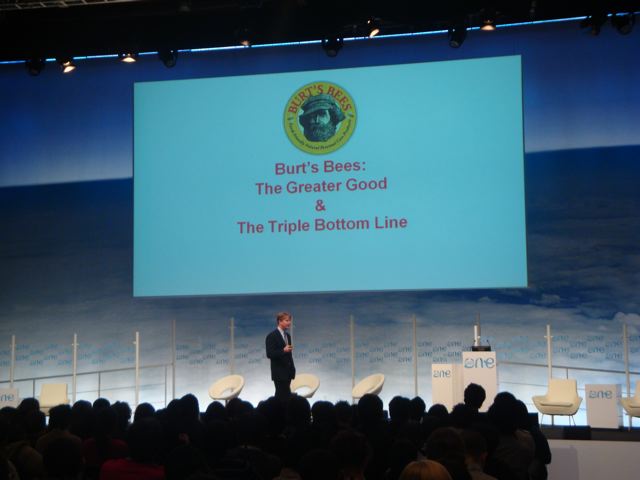Earlier this year Burts Bees CEO John Replogle addressed the One Young World Leadership Summit in London, a global forum for young people of leadership calibre. He talks here to Natural Products editor, Jim Manson about his Summit experiences and his ambitions for the Burts Bees brand in Britain and Europe.
The purpose of the One Young World initiative is to connect and bring together the “youngest, brightest and best” and to ensure that their concerns, opinions and solutions are heard and taken into account by those in power, whether in government, business or any other sector.
Speakers at this year’s Inaugural Summit included Kofi Annan, Bob Geldoff and Desmond Tutu.
The summit focused on 6 key Resolutions developed in response to the most pressing issues in the world today, as identified as by the One Young World Global Consultation Process, a poll of over 15,000 respondents aged 18-27 years old from 34 countries in every continent on the planet.
Natural Products: How did you get to be involved in the One Young World Leadership Summit?
John Replogle: We heard about Summit and the initiative about six months ago and straight away wanted to be part of it. We just saw a great fit with our values.
NP: And what was Burt’s Bees involvement at the Summit?
JP: Well, we sponsored 10 delegates, two from each of our five markets and earlier today I was privileged to have been able to speak to around 1,000 delegates at the conference — what an incredible collection of talent.
NP: What messages did you want to communicate to delegates?
JP: To consider that we share a common planet and common challenges, wherever we come from. I told them that we — in business — need to rethink our social contract in solving the world’s most intractable problems. So I challenged the group to come up with series of resolutions.
NP: What type of resolutions?
JP: Well, earlier in the day the delegates had agreed that fighting priority should be the top priority. They also added climate change. I asked them to think about addressing other, wider challenges. And I have to say I was absolutely blown away by the ideas and commitment of the people in the room.
NP: Do you think big business can and will rise to the challenge of these huge global challenges?
JP: It has to. And although of course we have finite resources there are now some great examples of multinationals already doing just that — rising to the challenge. You know, you can either take the front or the back edge of the this trend — of business actively engaging in these crucial issues. But I’d say that the risks are far bigger if you stay on the back edge.
NP: You’re over here in Britain. Can you tell me a little bit about your ambitions for the brand here and in the rest of Europe?
JP: We’ve been doing very well. Globally, sales are up 50% despite the recession. In Britain sales were up 40% in the calendar year and we expect the market here to double in value for us over the next two years.
NP: What sort of response are you getting from consumers here?
JP: We’re getting a great response from the British consumers. They’re evangelising for us, blogging for us, Facebooking for us! But we’ve also made heavy investment … and that will continue.
We’ve really been delighted by the consumer response — but we’ve just begun. Accessibility is key. To this end we are deepening our partnership with Whole Foods Markets and we’ve just had a fantastic window display in the London store. We’re also working closely with the folks at John Lewis and Boots.
NP: And what about the rest of Europe?
JP: The brand is just launching in France with Sephora, so we taking a partnership approach there. The natural personal care market is very well developed in France so we will be listening to the market with a French ear — and partnering with the folks at NaTrue.
NP: What are the central messages you try to communicate with the Burt’s Bees brand?
JP: We probably define brand-building differently to other players in the sector. When we look at our customers we’re looking more at psychographic rather demographic indicators. Interestingly, the strongest indicators (of our target audience) are a commitment to wellbeing, sports and outdoors interests and choosing organic food. More important than gender and age.
For us, brand building is all about building relationships, telling our back-story and emphasising our commitment to the issues that underpin our ‘for the greater good’ mission. That’s why I was so pleased to take part in this year’s One Young World Summit.




